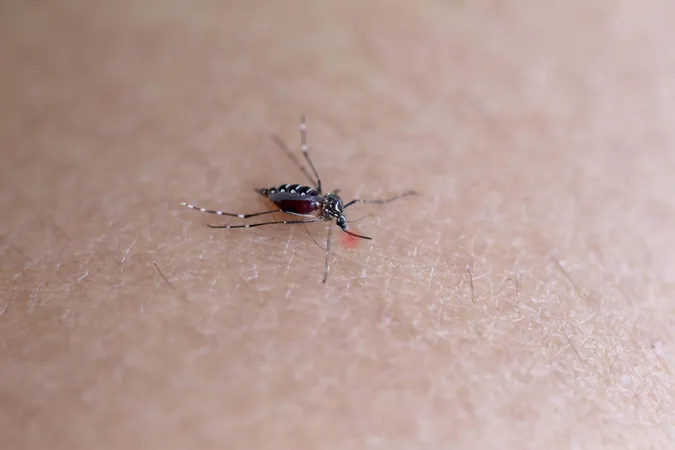
Alarming Surge: Record Dengue Fever Cases Reported Among UK Travelers
2025-03-27
Author: Liam
Overview of Dengue Fever Surge
Health officials in the UK are sounding the alarm as dengue fever cases among travelers returning to the country have skyrocketed to an unprecedented level. According to the UK Health Security Agency (UKHSA), there were a staggering 904 reported cases in individuals returning to England, Wales, and Northern Ireland in the year 2024. This marks a dramatic increase from the 631 cases logged in 2023 and represents the highest number of imported dengue cases since records began in 2009.
Regional Links and Precautions
The UKHSA highlights that the majority of these cases are linked to travel in southern and southeast Asia, where dengue fever is endemic. Officials are urging travelers to exercise caution and take necessary precautions when visiting regions known for the prevalence of this disease.
Transmission and Symptoms
Dengue fever, primarily transmitted through the bite of infected Aedes mosquitoes, poses a significant health threat in many parts of the globe, including the Caribbean, parts of Africa and Asia, Central and South America, and the Pacific Islands. Additionally, outbreaks have also emerged in certain regions of Europe, particularly in countries like Croatia, Spain, Portugal, Italy, and France.
It's crucial to note that dengue fever is not present in the UK, and the disease cannot be spread from person to person. Symptoms typically manifest between four to ten days after being bitten by an infected mosquito. Common symptoms include high fever, severe headaches, muscle and joint pain, nausea, rashes, and swollen lymph nodes. While most affected individuals recover within a few days, a small percentage may experience severe symptoms, like persistent vomiting, intense abdominal pain, and bleeding, necessitating medical attention.
Risk Factors and Preventive Measures
Certain groups are more at risk for severe illness from dengue, including young children, the elderly, pregnant women, and those with existing health conditions such as asthma or diabetes. Dr. Philip Veal, a public health consultant at the UKHSA, emphasizes the importance of taking simple preventive measures during travel. Steps such as using insect repellent, covering exposed skin, and sleeping under insecticide-treated bed nets can significantly reduce the risk of contracting mosquito-borne diseases like dengue.
Other Mosquito-Borne Illnesses on the Rise
The surge in dengue cases comes amid reports of other mosquito-borne illnesses. In 2023, there were 112 reported cases of chikungunya, which is characterized by severe joint and muscle pain—more than double the 45 cases reported the previous year. Similarly, the zika virus cases rose to 16, up from just eight in the year prior. While zika typically does not cause serious illness for most, it poses a critical risk to pregnant women, as the virus can be transmitted to the unborn fetus.
Travel Advice
Travelers are advised to utilize resources like the Travel Health Pro website, supported by the UKHSA, for information regarding health risks tied to various travel destinations. Additionally, it is recommended that individuals consult their GP, pharmacist, or travel clinic four to six weeks prior to their trip for guidance on necessary vaccines and medications, especially for malaria prevention.
Conclusion
Finally, Dr. Veal underscores an important reminder: 'Even if you’ve been to a country before, remember that you don’t have the same level of protection against infections as permanent residents and are still at risk.' As the world becomes increasingly interconnected, safeguarding your health while traveling has never been more crucial. Stay informed, stay safe!









 Brasil (PT)
Brasil (PT)
 Canada (EN)
Canada (EN)
 Chile (ES)
Chile (ES)
 Česko (CS)
Česko (CS)
 대한민국 (KO)
대한민국 (KO)
 España (ES)
España (ES)
 France (FR)
France (FR)
 Hong Kong (EN)
Hong Kong (EN)
 Italia (IT)
Italia (IT)
 日本 (JA)
日本 (JA)
 Magyarország (HU)
Magyarország (HU)
 Norge (NO)
Norge (NO)
 Polska (PL)
Polska (PL)
 Schweiz (DE)
Schweiz (DE)
 Singapore (EN)
Singapore (EN)
 Sverige (SV)
Sverige (SV)
 Suomi (FI)
Suomi (FI)
 Türkiye (TR)
Türkiye (TR)
 الإمارات العربية المتحدة (AR)
الإمارات العربية المتحدة (AR)